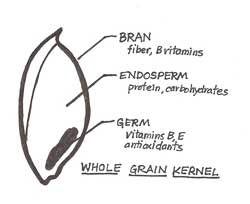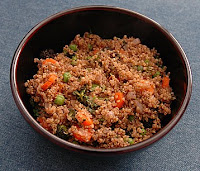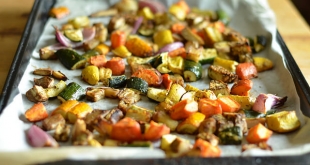Simple vs. Complex: Why it’s not that simple…
Most sources will tell you that there are two different kinds of carbohydrates — simple and complex. I don’t like that explanation, mainly because it sets us up with an “either/or” method of thinking that has led to some characterizing carbs as “good” (complex) versus “bad” (simple). Folks, it’s just not that black and white.
Instead let’s imagine all the carbohydrates in the world standing in straight line. One extreme end of that line would be simplest of carbs, the other would be the most complex. All carbs fall somewhere on that line. Some are more complex or simple than others. Make sense? Lovely! Moving on…
Refined Carbs
Like I said yesterday, somewhere along the way, carbs got a bad reputation. I personally blame MTV (kidding). Hence, you’ll hear a lot of people talk about “good” and “bad” carbs. I’m not generally a fan of deeming any food good or bad. It’s just food. Some choices are more beneficial than others. All have their rightful place in a well-balanced eating plan.
But, within that, there is a distinction of carbs that I think we can all agree are less beneficial than others and should be consumed in extreme moderation. That would be “refined carbs.”
Refined carbs are carbohydrates that have been largely stripped of their fiber and nutrients. They are easy to identify because they are mostly “white” carbs (yep…it’s a white thing…). White bread, white pasta, potato chips, refined sugar (the white kind that comes in the bag…yep…that’s the one). Most refined carbs have a non-refined counterpart: whole wheat bread and pasta, whole grain chips, raw sugar, etc.
I call out refined carbs for two reasons. First, because if we were going to label any carb “bad” (and I wouldn’t, but still…) they would be it. They give you a lot of calories, with packaged foods they are often prepared using less than stellar methods (frying in trans fats, with a boatload of sodium, etc.) and in return they give you very little nutrition. And because your body can easily convert refined carbs to blood sugar (see below), you get a big spike followed by an even bigger crash.
Think of refined carbs like that ex-boyfriend or girlfriend you were once so ga-ga about…they seemed like the best thing ever…but in reality they were are just no good for you! The post-op WLS patient should only consume refined carbs in extreme (meaning not very often at all) moderation.
Whole Grains and Other Complex Carbs
Increasingly, you’ll see the term “whole grain” on food packaging. But what is it?
Carbs are rated from the simplest of the simple to the most complex of the complex based on how fast your body can convert them into energy. The simplest carbohydrates can be quickly converted and can enter your blood system very fast, causing your blood sugar level to rise and then eventually fall again. More complex carbohydrates (ones that contain fiber, which we’ll talk about Thursday) take longer to break down and thus keep your blood sugar at a sustained level for a longer period of time.
What does this all mean to you? Well the simplest sugars will give you quick energy but when your blood sugar level quickly falls, your body will crave more carbs to get that level up again (hence the adage, “carbs beget carbs”). More complex carbs take longer to burn and don’t cause that same reaction.
Also, when we aren’t using the energy from carbohydrates, our body converts them fat and stores it. The simpler the carb, the easier it is for the body to convert the carb to fat. Now if we want to demonize anything in this process, let’s demonize body fat. Body fat is the ENEMY. We don’t want it! We don’t need it! BOOOOOO!!! HISSSSSSS!!! (That felt good.)
The Inevitable Caveat
Even with simpler carbs, the body will treat different kinds differtly. Your body doesn’t see a banana (a very simple carb among fruits) the same way it sees a piece of white bread or a snack cake.
Believe it or not, there is a use for natural simpler carbs in the body. And I’m going to tell you what that use is…tomorrow! (Red Herring! How dare she!)
So, in summary, here’s what you need to know about the simplicity and complexity of carbs:
- Try not to think of carbs as “simple vs. complex” but rather on a scale from the most simple to the most complex
- Refined carbs are foods like white bread and pasta, white sugar and some types of snack foods like potato chips and cakes
- Refined carbs should only be consumed in extreme moderation
- Simpler carbs are easiest for your body to convert to both energy and fat and they cause a rapid rise in your blood sugar level, followed by a quick lowering (or crash)
- Complex carbs give your body energy but raise your blood sugar more slowly and steadily
- The body reacts differently to natural, simpler carbs like fruits and vegetables than it does to refined carbs
Stay tuned tomorrow to learn how a banana can actually be your friend!
 Bariatric Foodie Play with your food
Bariatric Foodie Play with your food





